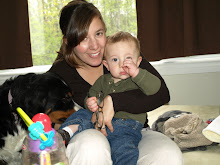As I start doing some paid freelance writing work, I thought about some questions for an accountant that I may have, and thought other mom entrepreneurs might have as well. So I asked these questions to an accountant in Orillia, Ontario by the name of Gord Turpling and I am posting answers to some of the questions I had.
1. For a sole proprietor, what % of what you make, would you be safe to calculate to put way for taxes?
This depends on several factors unique to each sole proprietor's situation. The amount of taxable income the proprietorship generates is the main one. A sole proprietor earning $150,000 per year is going to be in a different tax bracket than one earning $15,000 per year. Each individual may also have different personal tax credits to which they are entitled, such as for dependent children. So I can't really say whether 15% or 25% or 35% is a good guideline for how much to set aside for taxes. It really depends on each person's individual situation. One thing to keep in mind, is that the self-employed must pay both the employee and employer Canada Pension Plan contributions on their self-employment earnings. For 2010, this equates to equates to 9.9% of business income between $3,500 and $47,200 and can increase one's overall tax liability.
2. What advice would you give to a entrepreneur starting out, in terms of their accounting practices?
Keeping accurate records is important for several reasons, including allowing one to assess business performance and to comply with CRA's various record keeping requirements. Maintaining a separate bank account or credit card for business purposes can aid in keeping personal and business expenses separate.
Also, managing cash flow is very important so that the business is able to pay its suppliers and remit any HST or withholding tax obligations it may have on time.
3. How much can a small business owner expect to pay in accounting fees in their first year?
Accountants generally charge by the hour so this will depend on the amount of assistance that the business owner requires and how well the records are maintained.
4. Any software, or tracking/accounting systems do you recommend?
From my experience, Quickbooks and Simply Accounting are the two software packages most often used by sole proprietors. If someone is uncomfortable with using accounting software, or they don't have a computer, she could consider keeping a manual accounting system using cash receipts and disbursements ledgers.
5. Any books, or courses you recommend for small business owners, especially starting out?
CRA's website has a section for new businesses, which some of your readers may find useful: http://www.cra-arc.gc.ca/tx/bsnss/sm/menu-eng.html.
The institute of Chartered Accountants of Ontario also has various articles posted on its website, many of which would likely be of interest: http://www.icao.on.ca/Public/CAfinancialAdvice/1009page1240.aspx
6. At what stage in your business, do you think you need to start consulting an accountant?
It is often a good idea to consult with an accountant before the business commences. Issues concerning bringing assets into the business and organizational structure are best reviewed at this time.
I want to thank Gord for taking the time to answer my questions, and I think any information helps. Have any accounting experiences yourself that you would like to share, feel free to comment, and share the wealth of information.
About Me

- Dish-licious.ca
- We are a community group for mothers, currently in the Orillia to Gravenhurst, Ontario area, we focus on food, nutrition and health for our family. We draw on expert knowledge such as naturopaths, but best of all we learn and share knowledge from fellow mothers. Even if you have never cooked before we can help you get started. We want to encourage moms to cook and learn the importance of what they put on the table. We are REALISTIC and STRIVE to make a healthy lifestyle accessible to everyone, through education. Membership is FREE so sign up to follow us today! We work together to share knowledge of everything from recipes, nutrition, to how to plan ahead. We offer something for every lifestyle, from just the basics of cooking, spaghetti and pizza, to people looking to learn something new about nutrition, organics or even raw cooking. Never cooked before, let us help you get started, we offer some basic cooking lessons from a mom, to help get you started and then this group will help keep you going for a lifetime of providing healthy and nutritious meals for your family. We offer: Workshops, share recipes, and fun get togethers.

No comments:
Post a Comment